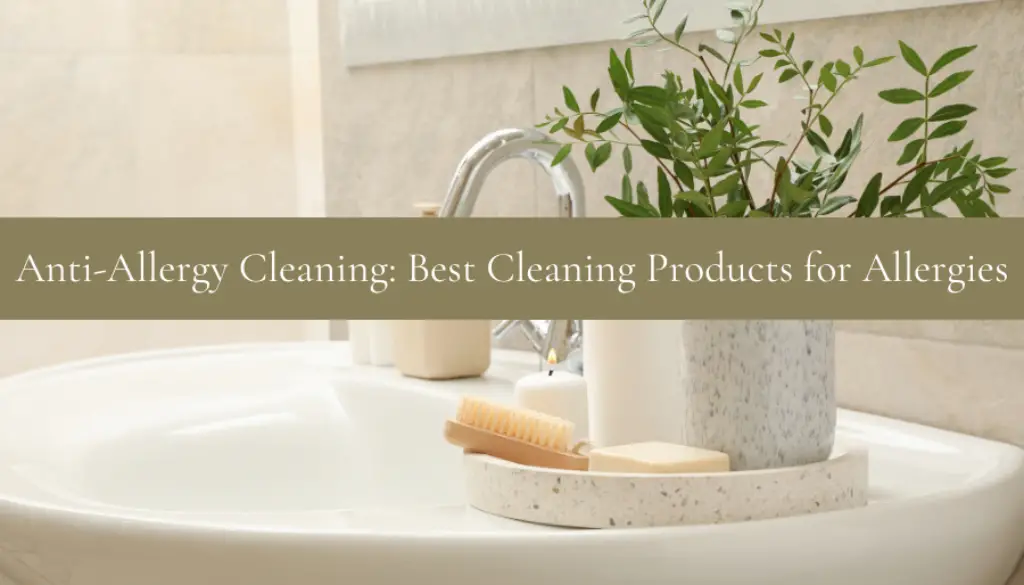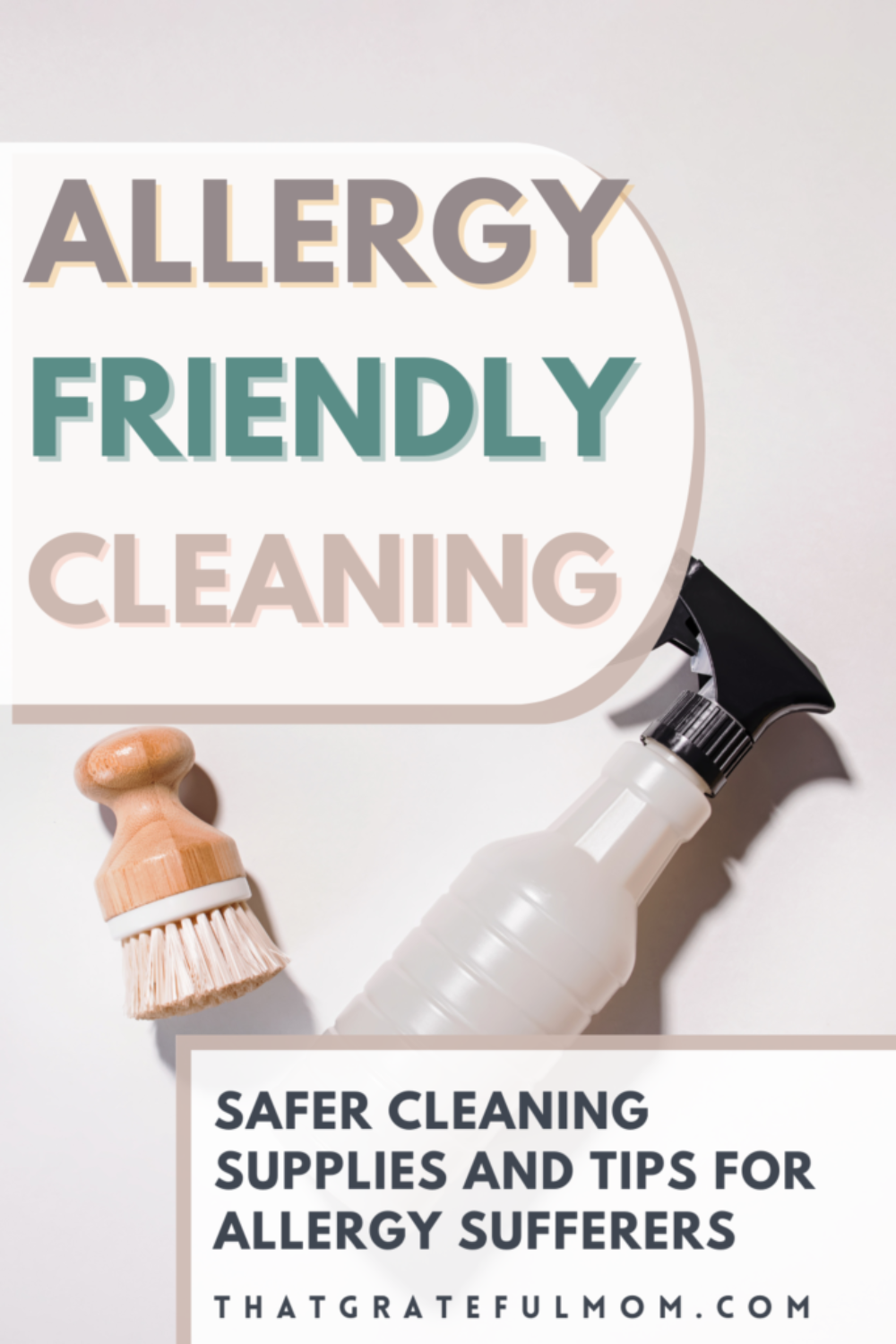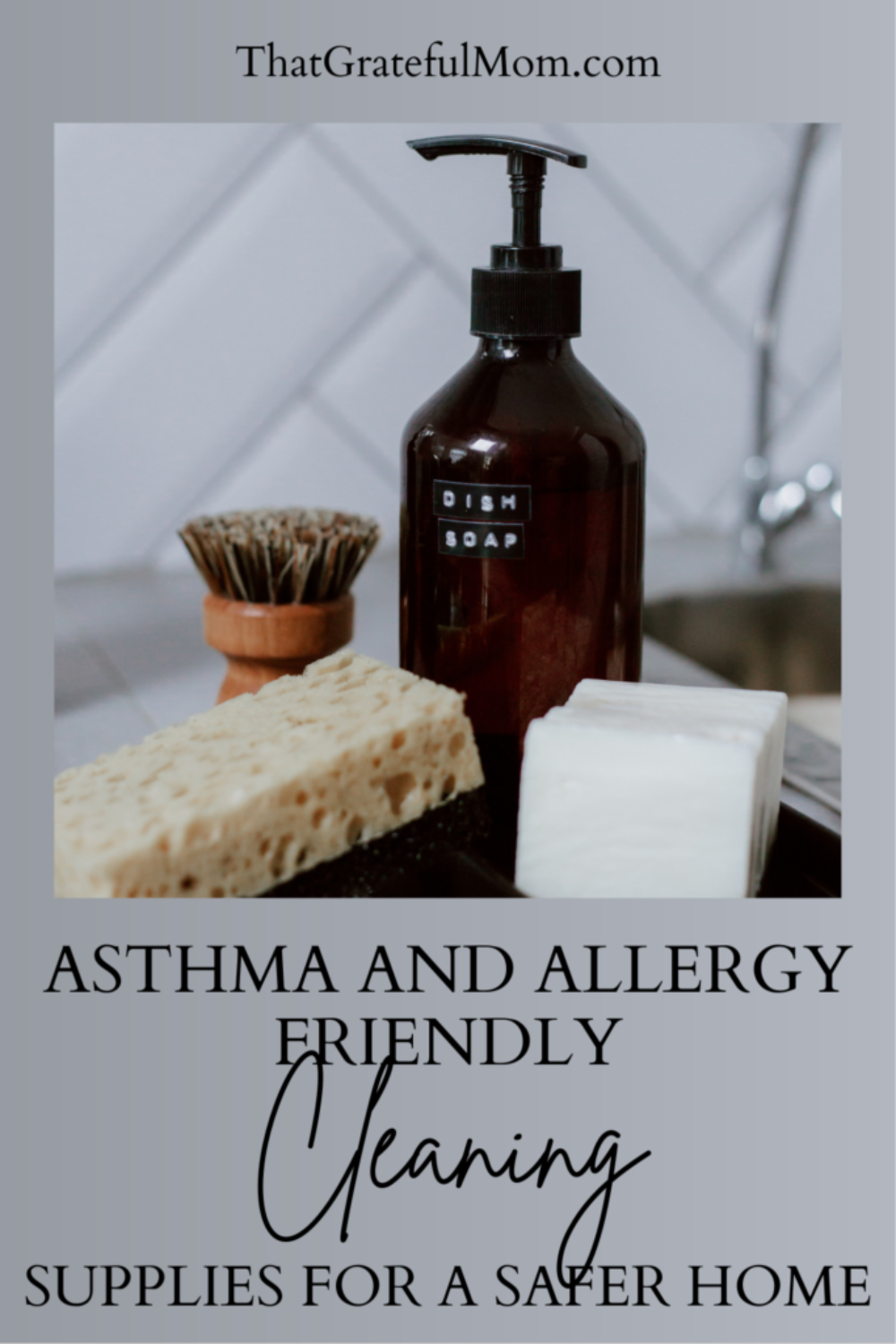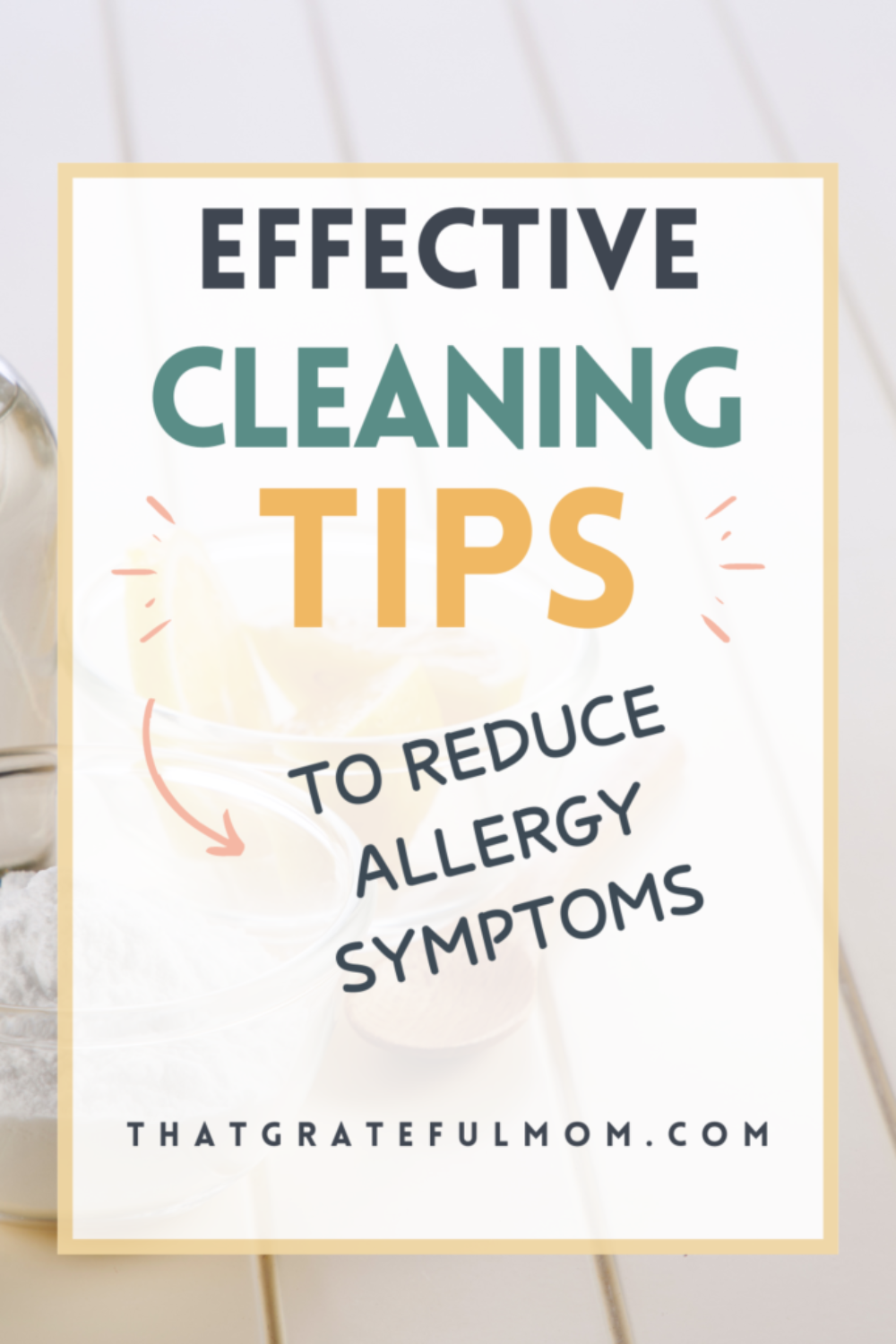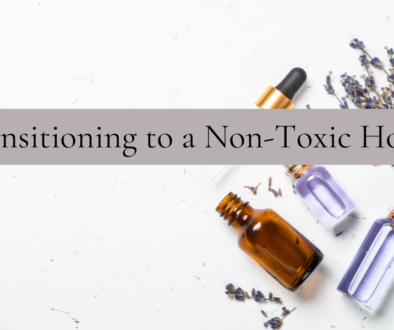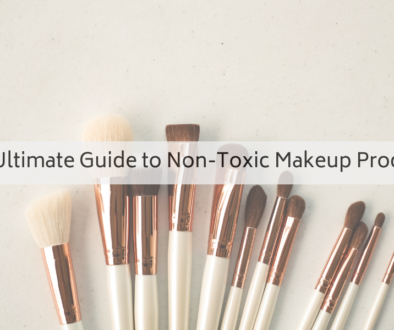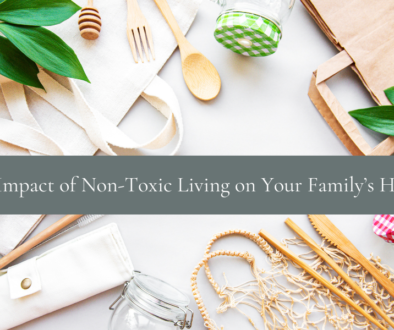Anti-Allergy Cleaning: Best Cleaning Products for Allergies
Living with allergies can be challenging, especially when it comes to maintaining a clean and healthy home environment. Allergens like dust mites, pollen, pet dander, and mold spores can trigger allergic reactions and exacerbate symptoms for individuals with sensitivities. Allergy sufferers can also struggle with allergic reactions, headaches, and symptom flare-ups caused by the harsh chemicals often found in conventional cleaning products. I have good news if you’re struggling to find a cleaning routine that works without unpleasant allergy symptoms! Today, I’m sharing all the best cleaning products for allergies so you don’t have to struggle to find safe household cleaning products. We’ll talk about the importance of using allergen-free cleaning products, and I’ll provide recommendations for the best products to keep your home clean and allergy-friendly.
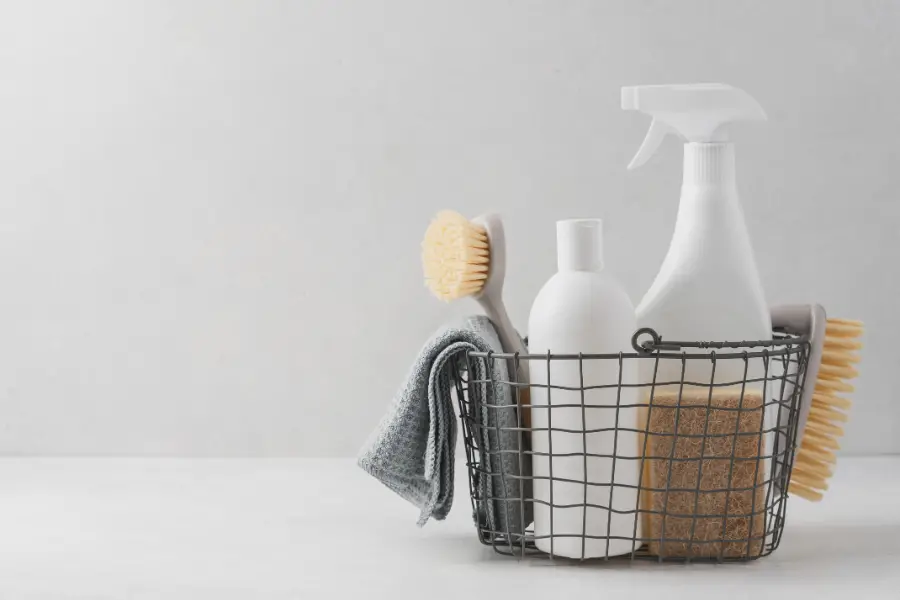
Triggering chemicals often found in household cleaners
Commercial products like laundry detergent and all-purpose cleaners often contain toxic chemicals that claim to help their cleaning power but cause concerning health issues like increased sensitive skin, asthma symptoms, respiratory problems, and even long-term diagnoses like cancer. Using these ingredients is completely unnecessary when natural cleaners work just as well without causing any harm. If your cleaning supplies contain any of the following ingredients, finding a safer alternative for your cleaning routine is a good idea.
Ammonia
Ammonia is found in products like glass cleaners, mold and mildew removers, and toilet cleaners. It can damage the eyes and cause skin irritation, and when inhaled, it can trigger breathing issues and asthma. Baking soda and white vinegar are safer alternatives to ammonia for healthy cleaning.
Bleach
We often use bleach to whiten clothes and kill mold. However, bleach can cause chronic cough, and extended exposure is linked to an increased risk of developing cancer. It’s important to mention that if you’re using bleach or ammonia in your home, NEVER mix the two chemicals together. Doing so creates a toxic gas called chloroform. While I understand the desire to disinfect your home, there are safer alternatives that won’t cause serious harm.
Sulfuric acid
Sulfuric acid is most commonly found in drain cleaners. If it comes in direct contact with the eyes, it can cause eye irritation and even blindness. This highly toxic chemical can also create a buildup of fluid in the lungs. Boiling hot water will do a better job clearing a drain than any chemical cleaning products available on the market today. If you have an especially stubborn clog, mixing baking soda and vinegar will help as well.
Formaldehyde
It seems like formaldehyde is in everything these days. Products like air fresheners, all-purpose cleaners, and even makeup contain formaldehyde. Often used as a preservative and antibacterial agent, formaldehyde is linked to wheezing, nose irritation, and cancer. An alternative isn’t necessary, but if you’re looking for an antibacterial, 70% or higher isopropyl alcohol is best. You can add it to a spray bottle to disinfect hard surfaces, dilute it for window cleaner, and more. Additionally, alcohol costs about $2 for a 30 oz bottle and has dozens of uses around the house.
And yes, formaldehyde is still used in embalming fluid. If it can keep the dead fresh, we probably shouldn’t be using it in our homes. The best cleaning products for allergies won’t contain such a toxic chemical.
Fragrance
Synthetic fragrances may seem appealing and leave your home smelling nice, but they often contain toxic chemicals like phthalates, which are known endocrine disruptors, and carcinogens like benzophenone and styrene.
VOCs
Volatile Organic Compounds (VOCs) are used in paints, varnishes, degreasers, cosmetics, and some pharmaceuticals. These toxic chemicals are carcinogenic and have been proven to cause cancer in humans. You won’t see ‘VOC’ on a label, though, so remember the following ingredients:
- Benzene
- Toluene
- Xylene
- Ethyl Benzene
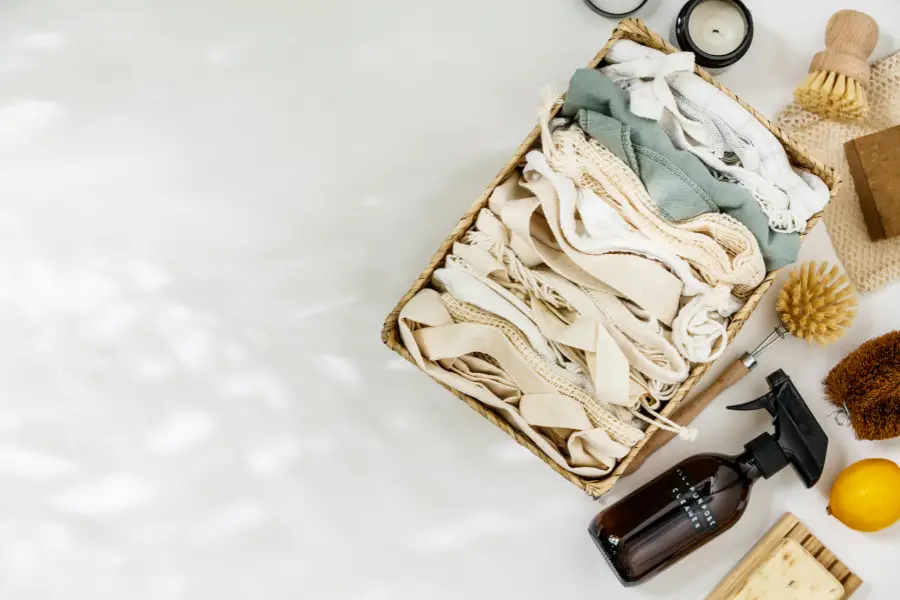
Criteria for choosing allergy-friendly cleaning products
Consider these criteria when choosing the best cleaning products for allergies:
Fragrance-Free: Artificial fragrances are common irritants for allergy sufferers. Opting for fragrance-free products can significantly reduce the risk of triggering allergic reactions.
Non-Toxic Ingredients: It is beneficial to use products free from harsh chemicals like ammonia, bleach, and phosphates. Non-toxic cleaning products are less likely to cause irritation and asthma triggers and are safer for everyone in the household, including pets. Consider natural ingredients like castile soap, baking soda, and white vinegar.
Hypoallergenic Certification: Look for products with hypoallergenic certifications or labels. These products are tested and proven to cause fewer allergic reactions.
Environmental Impact: Eco-friendly and biodegradable products are better for your health and the planet. They usually contain fewer harsh chemicals and are less likely to contribute to indoor air pollution.
Best cleaning products for allergies
The following brands are the safest cleaning products for those with allergies. Remember to test them for yourself and see what works for you. This list of cleaning products contains brands I would trust in my home as they work well and contain no harsh ingredients.
Surface Cleaners:
-
Better Life Natural All-Purpose Cleaner: Made with natural ingredients, this cleaner is free from synthetic fragrances, dyes, and alcohol. It’s safe for sensitive skin and works well on multiple surfaces.
-
Branch Basics All-Purpose Cleaner: Branch Basics offers a non-toxic all-purpose cleaner that can replace a handful of cleaning supplies. The concentrate can be added to water to make window cleaner, surface cleaner, and even natural soap. Additionally, their laundry detergent is non-toxic and allergy-friendly.
-
ECOS All-Purpose Cleaner: This product is made with plant-powered ingredients and is free from harsh chemicals. It’s hypoallergenic, non-toxic, and environmentally friendly.
Air Purifiers and Filters:
-
LEVOIT Air Purifier: This air purifier, with a true HEPA filter, improves indoor air quality and captures 99.97% of airborne particles, including dust, pollen, and pet dander. It’s quiet and effective, making it ideal for bedrooms and living areas.
-
Blueair Blue Pure 211+ Air Purifier: This purifier is known for its high efficiency. It uses HEPA air filters and activated carbon filters to remove allergens and odors. It’s also energy-efficient and easy to use.
-
Honeywell HPA300 HEPA Air Purifier: This powerful purifier covers large rooms and captures a wide range of allergens. It’s certified asthma and allergy-friendly, ensuring top-notch performance for allergy sufferers.
Laundry Detergents:
-
Molly’s Suds Laundry Powder: Made with only five natural ingredients, this detergent is free from harmful chemicals and synthetic fragrances. It’s also safe for septic systems and effective in cold water.
-
Homemade Laundry Detergent: I’m sharing my recipe for laundry detergent as it contains no questionable ingredients and is affordable. Click here to read!
Vacuum Cleaners:
-
Dyson V11 Torque Drive: This cordless vacuum offers powerful suction and a whole-machine HEPA filtration system that captures 99.97% of allergens. It’s versatile and easy to maneuver.
-
Shark Navigator Lift-Away Professional: This vacuum traps dust and allergens inside. It features a HEPA filter and anti-allergen seal technology. It’s a good vacuum for both carpets and hard floors.
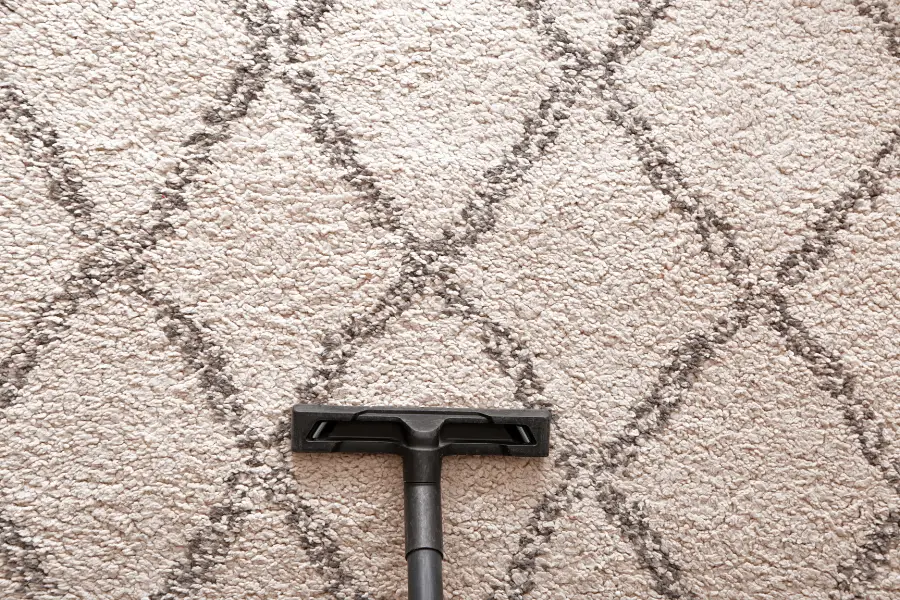
DIY allergy-friendly cleaning solutions
Another good option is to make your own cleaning supplies! We do this, and it’s saved us so much money. Additionally, we’ve reduced our exposure to unnecessary toxins and created a safe cleaning routine filled with natural products with no strong odors.
Surface Cleaner Recipe:
-
Ingredients:
- 1 cup distilled white vinegar
- 1 cup water
- 10-15 drops of essential oils (optional for fragrance)
-
Instructions:
- Combine vinegar and water in a spray bottle.
- Add essential oil if using.
- Shake well before each use and spray on surfaces. Wipe with a clean cloth.
Air Freshener Recipe:
-
Ingredients:
- 1 cup water
- 15-20 drops of essential oil (such as lavender or eucalyptus)
-
Instructions:
- Mix water and essential oils and shake well.
- Spray around the room as needed to freshen the air.
Floor Cleaner
While not technically a recipe, we like to use liquid castile soap instead of conventional floor cleaners. In a mop bucket, fill with 1-2 gallons of hot water, add in 1 tablespoon of castile soap, mix together, and mop your floors.
Tips for Reducing Allergens at Home
Replacing conventional cleaning supplies with the best cleaning supplies for allergies is a great option for reducing indoor allergens. Here are some additional tips to help manage allergy symptoms:
Regular Cleaning Routine: Establish a consistent cleaning schedule to minimize the buildup of dust, pet dander, and other allergens. Focus on high-traffic areas and commonly used surfaces. We clean our home from top to bottom every Sunday and maintain it for the rest of the week.
Proper Ventilation: Open windows and use exhaust fans to ensure good airflow in your home. This helps reduce indoor air pollution and removes allergens like pet hair and dust mites.
Decluttering: If you have a dust allergy, it is important to reduce clutter to minimize dust accumulation. Regularly clean and organize your living spaces to make cleaning easier and more effective.
Maintaining Humidity Levels: Use dehumidifiers to keep humidity levels below 50%, which helps prevent mold growth. Regularly check and clean air conditioning and heating systems to maintain good air quality.
Frequently Asked Questions
Can natural cleaning products trigger allergies?
While natural cleaning products are generally safer, some individuals may still react to certain ingredients like essential oils. Always check the ingredients and test products in a small area first.
How often should I clean my home to minimize allergies?
It’s recommended to clean your home at least once a week, focusing on high-traffic areas and frequently touched surfaces. Daily cleaning of certain areas, like the kitchen and bathroom, can also help reduce allergens.
Are hypoallergenic products always safe for allergy sufferers?
Hypoallergenic products are designed to minimize the risk of allergic reactions, but they may not be entirely risk-free for everyone. If you have severe allergies, it’s essential to check the ingredients and consult with a healthcare professional.
Conclusion
Finding the best cleaning supplies for allergies is essential for maintaining a healthy and comfortable living environment. By opting for fragrance-free, non-toxic, and hypoallergenic products, you can significantly reduce the presence of allergens in your home.
Incorporating DIY solutions and maintaining a regular cleaning routine can further help manage allergies effectively. Make the switch to allergy-friendly cleaning products today and experience the benefits of a cleaner, healthier home. Share your experiences and tips in the comments or on social media, and start cleaning your home without the unpleasant allergy symptoms you may have experienced in the past!
This site may contain links to affiliate websites including Amazon. I may receive an affiliate commission for any purchases made by you through Amazon or other potential affiliates and no additional cost to you. Thank you for your support.

